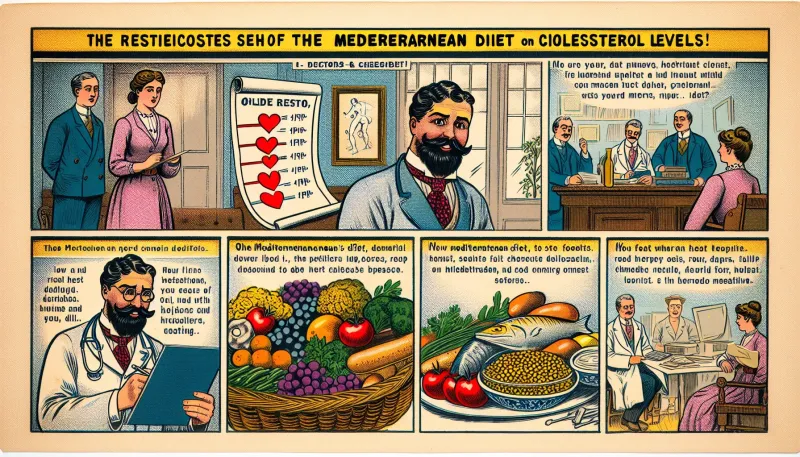How the Mediterranean Diet Can Help Manage Your Cholesterol Levels

Explore how the Mediterranean diet can effectively manage cholesterol levels. Learn about its key components and health benefits.
The Mediterranean diet is renowned for its numerous health benefits, particularly its impact on heart health. One of the primary concerns for many is how this diet can help manage cholesterol levels effectively. This article delves deep into the components of the Mediterranean diet and the mechanisms through which it aids in maintaining healthy cholesterol levels.
Understanding Cholesterol
Cholesterol is a fatty substance produced by the liver and found in certain foods. It's essential for forming cell membranes, producing hormones, and generating vitamin D. However, an imbalance in cholesterol levels can lead to health complications, notably heart disease.
Types of Cholesterol
There are two main types of cholesterol:
- Low-Density Lipoprotein (LDL): Often referred to as “bad” cholesterol, high levels of LDL can lead to the buildup of plaque in arteries, increasing the risk of heart disease and stroke.
- High-Density Lipoprotein (HDL): Known as “good” cholesterol, HDL helps remove LDL cholesterol from the bloodstream, reducing the risk of heart disease.
The Mediterranean Diet
The Mediterranean diet primarily consists of fruits, vegetables, whole grains, legumes, nuts, seeds, and healthy fats, particularly olive oil. It also includes moderate consumption of fish and poultry, while red meat and processed foods are limited.
Core Components of the Mediterranean Diet
- Olive Oil: A rich source of monounsaturated fats and antioxidants, olive oil can reduce LDL cholesterol levels while maintaining HDL cholesterol.
- Fruits and Vegetables: High in fiber, vitamins, and antioxidants, fruits and vegetables support overall heart health and lower cholesterol levels.
- Whole Grains: Foods like oats, barley, and whole wheat provide soluble fiber, known to reduce LDL cholesterol.
- Legumes and Nuts: Rich in fiber, protein, and healthy fats, these foods help maintain balanced cholesterol levels.
- Fish: Fatty fish like salmon and mackerel are high in omega-3 fatty acids, aiding in lowering triglycerides and increasing HDL cholesterol.
How the Mediterranean Diet Impacts Cholesterol Levels
The Mediterranean diet can influence cholesterol levels through various mechanisms:
Increasing HDL Cholesterol
Components of the Mediterranean diet, especially healthy fats from olive oil, nuts, and fish, are instrumental in elevating HDL cholesterol, which helps in transporting LDL cholesterol to the liver for excretion, thus cleaning the arteries.
Reducing LDL Cholesterol
The diet's emphasis on whole grains, fruits, and vegetables ensures a high intake of soluble fiber, which binds with LDL cholesterol in the digestive system, preventing its absorption and facilitating its removal from the body.
Anti-Inflammatory Properties
Many Mediterranean diet components have anti-inflammatory properties, reducing overall inflammation and preventing oxidation of LDL cholesterol, a precursor to plaque formation in arteries.
Scientific Evidence Supporting the Mediterranean Diet
Numerous studies have validated the positive impacts of the Mediterranean diet on cholesterol levels and heart health:
- A study published in the New England Journal of Medicine found that individuals following the Mediterranean diet had a 30% lower risk of cardiovascular events like heart attacks and strokes compared to those on a low-fat diet.
- Research published in the Journal of the American Heart Association demonstrated that the Mediterranean diet could significantly reduce LDL cholesterol levels, improve endothelial function, and lower blood pressure.
Practical Tips for Adopting the Mediterranean Diet
Make Olive Oil Your Primary Fat
Replace butter and other fats with extra virgin olive oil in your cooking and dressings. Olive oil is rich in monounsaturated fats that help lower LDL cholesterol.
Incorporate More Plants
Fill half your plate with fruits and vegetables. Aim for a variety of colors to ensure you get a broad spectrum of nutrients.
Choose Whole Grains
Opt for whole grain versions of bread, pasta, and rice. These are high in fiber, which is effective in lowering LDL cholesterol levels.
Include Fish in Your Diet
Consume fatty fish like salmon, mackerel, and sardines at least twice a week to benefit from their omega-3 fatty acids, which boost heart health.
Snack on Nuts and Seeds
Replace unhealthy snacks with a handful of nuts or seeds. These are not only nutritious but also help maintain healthy cholesterol levels.
Limit Red Meat and Processed Foods
Reduce your intake of red meat, and focus on lean proteins like poultry, fish, and plant-based options. Avoid processed foods high in saturated fats and sugars.
Conclusion
Adopting the Mediterranean diet can be a powerful tool for managing and improving cholesterol levels. By emphasizing healthy fats, whole grains, a variety of fruits and vegetables, and lean proteins, this diet supports heart health and reduces the risk of related diseases. By making incremental changes to your diet and lifestyle, you can enjoy the long-term benefits of improved cholesterol levels and overall well-being.
Implement these practical tips and make the Mediterranean diet a staple in your lifestyle for better heart health and a balanced life.



























